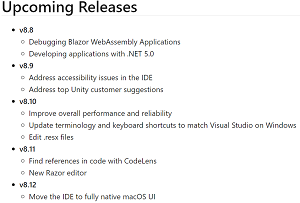News
UI Goes (Partly) Native in New Visual Studio 2019 for Mac v8.10
Microsoft shipped Visual Studio 2019 for Mac v8.10, furthering the effort to convert the UI layer to native macOS, an effort scheduled to reach culmination with VS for Mac 2022.
"We're putting significant effort into rewriting the code responsible for Visual Studio for Mac's UI to use fully native code," said Jon Galloway, senior program manager, .NET Community Team, in a June 2 blog post announcing VS for Mac v8.10. He said benefits of this effort will include:
- Improved performance and reliability
- Improved accessibility through better integration with macOS and its built-in assistive technologies
VS for Mac v8.10 starts off that long-term effort with a natively rewritten Solution Window and NuGet dialog.
This UI conversion effort was foreshadowed in April with a sneak peek at the 64-bit Visual Studio 2022.
"Our goal with Visual Studio 2022 for Mac is to make a modern .NET IDE tailored for the Mac that delivers the productive experience you've come to love in Visual Studio," Microsoft said at the time. "We're working to move Visual Studio for Mac to native macOS UI, which means it will come with better performance and reliability."
Speaking of performance and reliability, that has been a sore spot for the dev team, dating back to complaints in 2018 that spurred a refresh with a conversion to internals borrowed from the VS for Windows IDE. "We've put all our energy toward addressing common issues raised by developers in our community," the dev team said at the time.
Galloway alluded to the problem in this week's announcement. "As mentioned earlier, our core focus for this year is delivering a great Visual Studio for Mac 2022 release. This is a significant engineering effort, which includes substantial changes to the UI layer and a focus on some key technical internals which will deliver higher stability and performance in the final release. When possible, we will include some of these enhancements in servicing releases to Visual Studio for Mac 8.10. Our plan is for Visual Studio for Mac 2022 to be the next major release, with regular servicing releases until then."
As far as VS for Mac 2022, there has been little guidance -- in fact, says a quick web search, exactly none besides the two Microsoft blog posts mentioned above. It's not in the VS for Mac roadmap, a December 2020 document that lists editions to v8.12, for which the only listed item is: "Move the IDE to fully native macOS UI." So maybe "VS for Mac 2022" is the new "VS for Mac 8.12," seeing as how Galloway this week said, "the full UI refresh won't be complete until the Visual Studio for Mac 2022 release." (We would ask, but that would involve diving into the time-consuming quagmire of a Microsoft PR media inquiry.)
 [Click on image for larger view.] VS for Mac Roadmap (source: Microsoft).
[Click on image for larger view.] VS for Mac Roadmap (source: Microsoft).
Besides the initial stages of the native UI refresh, Galloway said v8.10 includes:
- Support for the recently released .NET 6 Preview 4
- A new file system watcher
- Internal optimizations to prevent builds from waiting unnecessarily on design time builds
- A Rosetta 2 translation layer, the first step toward full support of Apple's new M1 chip, described by Wikipedia as an "ARM-based system on a chip"
Speaking about the aforementioned engineering fixes being made en route to VS for Mac 2022, Galloway said, "In many cases, this will be apparent in Visual Studio for Mac 8.10 through faster solution loads, faster and more accurate updates when git changes are made via the console, and faster build times. These are incremental internal updates that are building towards the full release in Visual Studio for Mac 2022."
With no specific guidance in the aforementioned blog posts or the roadmap, we're guessing that will come sometime next year.
About the Author
David Ramel is an editor and writer at Converge 360.